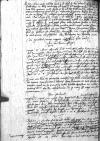Letter #3913
Ioannes [DANTISCUS] to UNKNOWNHeilsberg (Lidzbark Warmiński), 1545-04-09
Manuscript sources:
| ||||
Text & apparatus & commentary Plain text Text & commentary Text & apparatus
Ioannes
Nobilis et erudite fidelis dilecte.
Eo quod
Vale et aliquando, ut apud exteros solebas, quodcumque etiam scribe.
